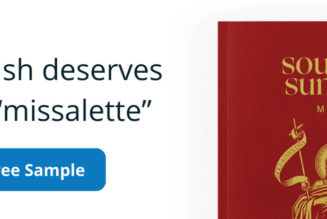
COMMENTARY: The Church we see mixes Divine and human, and the human beings in it show themselves to be very human indeed.
“Something as old, as big, as complex as the Catholic Church, and with its history, is going always to be compromised,” I’d written in an article on Dorothy Day’s understanding of the Church. My anonymous hard-core Calvinist critic, the one who made the snarky remark about Lent I’ve written about, didn’t like the line. He quoted it in a tweet and then remarked “how apologists enable abusers and deceivers. imagine if a Protestant said that about not becoming Roman Catholic.”
“As a convert,” Day had written in her diaries, “I never expected much of bishops.” She was 70 when she wrote that. She’d been a Catholic for 40 years and been dealing with bishops for most of that time. (For a guide to reading Dorothy Day, read this.)
“In all history,” she continued, “popes and bishops and father abbots seem to have been blind and power-loving and greedy. I never expected leadership from them. It is the saints that keep appearing all through history who keep things going. What I do expect is the bread of life, and down through the ages there is that continuity.”
She understood the point I summarized in the quote my Calvinist reader disliked. The Church we see mixes Divine and human, and the human beings in it show themselves to be very human indeed. One trip to the confessional shows us how true it is of us, and some experience of the Church will show us how true it is of the men in collars.
They Say It, Too
I responded with a tweet pointing out that Protestants say that all the time. “They also say it about their own churches when pastors go bad. It’s only one way of expressing the lesson of the wheat and the tares. It doesn’t enable anyone any more than Jesus did. If anything, it’s a spur to reform.” He didn’t respond. He’s a one-snarky-remark-and-out kind of tweeter.
What I said of the Catholic Church will be true of every Protestant body, even the most invisible-church ones. The longer their religious bodies last and the bigger they get, the more problems they will have. The older they are, the more they’ll tend to accept “business as usual” and have a fairly lax view of “as usual.”
The more wealthy and powerful they are, the more people will go into their hierarchies for worldly reasons, or go into the ministry sincerely and become worldly as they advance. The more people have invested in an institution, the more they’ll guard its reputation, and be tempted to cover up its leaders’ sins. The just revealed scandal in the Southern Baptist Convention should kill forever the Evangelical delusion that their bodies live more purely than the Catholic Church.
That’s the way human institutions work after the Fall. All Christians would like to believe that their religious body is special, that the effects of the Fall don’t reach so far as they do in other churches — and not nearly as far as they reach in the world outside the church.
My best man at our wedding and his wife belonged to a small house church of about 20 people. When I became an Episcopalian, they chided me for joining “the institutional church.” They pointed to the Episcopal church’s problems as evidence of its corruption, claiming their little church didn’t have such problems.
It was obvious to me, though, that their church was an institution, protected to some extent by being so tiny and being made up of a self-selected membership. They claimed to have no hierarchy, but they might as well have put a bishop’s miter on one man. They set up boundaries for who could join and rules for members who wanted to remain. In other words, basically a 20-person version of the “the institutional Church.” This was obvious to me, but not to them.
A Spur to Reform
If what I say is true of everyone, it means that everyone should be very, very vigilant, precisely to avoid enabling abusers and deceivers. You know that the body of which you’re a part will develop over time into a place in which wicked men can (most likely will) flourish and in which average men can (definitely will) let them flourish. Knowing that, you have to do what you can to stop that happening.
Almost anyone who has been on the inside of a religious institution, even if a smaller, newer one, has seen this. For a host of reasons, which can be summarized in one word: people.
One of the obvious reasons is that most religious people want to think well of everyone, especially their leaders. Everyone wants to think old Pastor Jones really worries about young people, rather than being the creepy old man he seems to be. People suppress their inner alarm bells. “I mean, how could he be a predator? He’s a pastor. Everyone loves him!”
Another obvious reason is that it’s hard and dangerous work to be vigilant, because no one likes a whistleblower and the abusers won’t go down without a fight, and they fight dirty. It’s also damaging work. Exposing Pastor Jones hurts people. It can reduce their trust in the church and even threaten their faith. Insiders want to manage the situation to avoid public scandal, and they usually manage it very badly. Thereby causing even more scandal.
Like a Hawk
Knowing the Church will go wrong isn’t an excuse for it going wrong nor for our letting it go wrong. It’s a compelling reason for watching it like a hawk. My snarky Calvinist friend got it exactly backwards. (As he usually does — such is the danger of religious bigotry and easy snark.) But her corruption isn’t a reason for despair.
“Of course the Church is corrupt!” Day wrote in her diaries. “‘But this corruption must put on incorruption,’ St. Paul says, so I rejoice as I have in my short lifetime seen renewals going on, or read of them, and the excitement, the joy of this sense of renewal. … I read the lives of the saints, and knew that the renewal they brought — over and over, the St. Benedicts, St. Francis, St. Dominic, St. Vincent de Paul, St. Isaac Jogues, etc., etc., etc. — was not just a thing of the past but was going on, over and over.”
The problem is people, but people can be saints.
Join Our Telegram Group : Salvation & Prosperity







